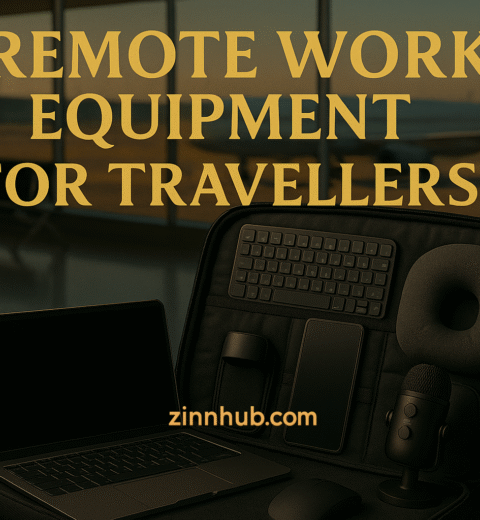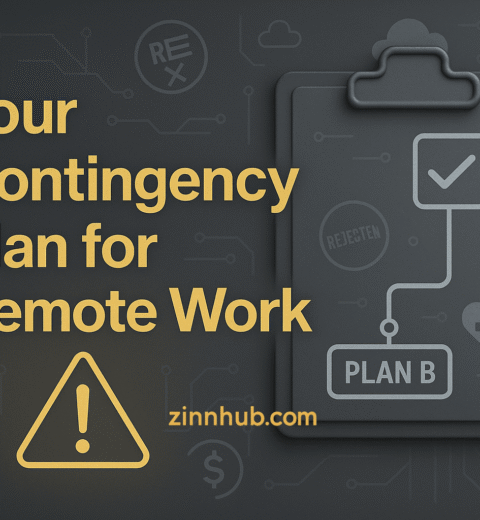Table of Contents
Particularly following the worldwide change brought about by the COVID-19 epidemic, remote work has evolved from being a rare benefit to a standard way of working. Remote work clearly has major advantages as more businesses and employees accept flexible working schedules! Not just for Zinners, but for Zinnectors too! Remote work can be a win-win for both sides.
What is Remote Work?
Sometimes remote work is known as telecommuting, flexible work, freelancing, or working from home. It speaks of a working style that lets experts complete their job outside of a conventional office setting. Allowing the work to be completed from anywhere! Instead of commuting to a central physical location every day like a company office, remote workers can complete tasks from wherever they are most productive. Whether that’s their home, a co-working space, a coffee shop, or even while travelling.
Remote work typically relies on digital tools and technology to maintain communication, collaboration, and workflow. Teams use platforms like Slack, Zoom, Microsoft Teams, Asana, Time Doctor and cloud-based file sharing systems to stay connected and ensure work gets done effectively.
👉 See our roundup of 10 popular monitoring tools for remote teams to discover which platforms might work best for you.
There are different types of remote work arrangements, including:
- Fully Remote: Zinners work from home or other locations full-time, and the company may not have a central office.
- Hybrid Remote: Zinners split time between working remotely and being in the office.
- Flexible Remote: Zinners have the freedom to choose when and where they work, depending on their needs and company policies.
Remote work changes the emphasis from where work is done to how it is done, giving results, autonomy, and flexibility top priority over conventional 9-to- 5 office culture. Zinners can work for several companies or businesses part-time or provide their skills for one-off projects.
How Freelancers Work Remotely
Independent professionals that provide clients their skills and services are freelancers. Often on a project-by-project basis without being tied to a single employer or Zinnector long-term. Remote work is a natural fit for freelancers because it gives them the freedom to work with clients all over the world from wherever they choose.

Here’s how freelancers at Zinn Hub typically operate remotely:
- Client Communication: Freelancers use email, video calls, messaging apps (like Slack, Telegram or WhatsApp), and project management platforms (like Trello, Asana, or Monday.com) to stay connected with clients, discuss project details, and manage expectations.
- Deliverables and Deadlines: Freelancers are hired to complete specific tasks or projects. Such as designing a website, writing content, creating marketing campaigns, or developing software. They work independently to meet deadlines and deliver the final work digitally, often through cloud storage or file-sharing services like Google Drive, Dropbox, or direct uploads.
- Flexible Work Hours: Unlike traditional employees, freelancers such as Zinners usually set their own schedules. They choose when to work based on personal productivity peaks, client needs, and project urgency. Some may work during traditional business hours, while others may prefer evenings or weekends.
- Invoicing and Payments: Freelancers are responsible for billing their clients. They typically send invoices after completing milestones or at the end of a project, and get paid via online payment systems like PayPal, Wise, direct bank transfers, or even Cryptocurrency.
- Self-Management: Because they aren’t under daily supervision, Zinners manage their own workloads, prioritise tasks, and handle administrative tasks like accounting, taxes, and marketing their services on Zinn Hub to find and attract new clients. Some companies turn to digital monitoring for accountability—but is it the right call? 👉 Read our take on whether tracking remote workers is ethical.
Working remotely lets Zinners diversify their income sources, engage with several clients at once, and enjoy great career autonomy. To succeed, though, also calls for great self-discipline, time management techniques, and proactive correspondence with Zinnectors.
Benefits for Zinners
1. Improved Work-Life Balance
Remote working lets Zinners take charge of their calendars, usually facilitating a better balance of personal and professional obligations. Zinners might use that time for family events, hobbies, or self-care instead of hours of driving. Parents can be more present for school pickups or events, and people can better manage their personal health needs—that is, show up for appointments free from the pressure of requesting time off. Reduced burnout and a general improvement in mental health resulting from a better balance help Zinners feel more fulfilled both at home and at work.
2. Increased Productivity
Studies have shown that, contrary to conventional understanding that remote workers would be less productive, Zinners working from home often show higher productivity. In a traditional office setting, distractions can be frequent — from casual chats with co-workers to unnecessary meetings and office noise. At home, Zinners can create their ideal working environment, customised to their needs. Many also find they can better manage their energy throughout the day, working during their personal peak productivity hours. Remote work encourages more intentional communication and task management, resulting in efficient workflows and focused output.
3. Cost Savings
Every day travel to work can be costly. Public transport passes, parking costs, petrol or diesel and vehicle maintenance all quickly add up! In addition, office workers sometimes pay extra for lunches, coffee runs, along with maintaining a professional wardrobe. Remote workers either completely cut out or significantly lower these costs. These savings over a year can be thousands of pounds, a significant financial boost that can be used towards travel, investments, savings, or personal projects.
4. Better Health and Well-Being
The connection between remote work and improved health is becoming increasingly evident. With the flexibility to plan meals and exercise routines more easily, Zinners often report eating healthier and exercising more regularly. The stress of commuting, which has been linked to higher blood pressure, increased anxiety, and lower life satisfaction is eliminated. Additionally, Zinners can also arrange their desks to suit their requirements, so lessening physical strain. A better, more balanced lifestyle has some people reporting improved sleep, fewer illnesses, and more energy.
5. Access to More Opportunities
Location constraints used to limit career options. Someone living in a rural area, for example, might have had to relocate to a big city to access high-paying or specialised jobs. Remote work erases these barriers. Talented Zinners can apply for roles across cities, counties, or even countries, greatly expanding their career possibilities. This is particularly transformative for those who face mobility challenges or family obligations that make relocation difficult. It fosters a more equitable workforce, where skills and contributions matter more than physical presence.

Benefits for Zinnectors
1. Access to a Wider Talent Pool
When hiring is no longer confined by geographic limitations, companies and Zinnectors gain access to a far broader and more diverse talent pool. This enables them to find candidates with highly specialised skills or unique experiences that might be rare in their local market. A diverse workforce can drive innovation, bring new perspectives to business challenges, and enhance creativity. Additionally, By hiring Zinners across many time zones, companies can also more readily staff 24/7 operations, so improving customer support and global reach.
2. Lower Overhead Costs
Maintaining an office space is expensive. Rent, utilities, office furniture, cleaning services, equipment maintenance, and supplies all represent significant costs. By moving to a remote or hybrid model, companies can downsize or even eliminate physical offices entirely, resulting in major cost savings. These savings can be reinvested into business development, technological improvements, or expanded business initiatives. Some companies even offer full time employees stipends to set up their home offices, a fraction of the cost compared to maintaining full-scale corporate spaces.
3. Increased Employee Retention
Offering remote work is no longer just a nice-to-have; it’s an expectation for many employees. Considered among the main advantages workers seek for a job are often flexible working schedules. Zinners at Zinn Hub who have the option to work remotely are more likely to report higher job satisfaction, and satisfied employees are less likely to seek opportunities elsewhere. High retention rates save businesses the large expenses related to hiring, integrating, and teaching new staff members. Moreover, loyal Zinners often deliver higher-quality work and are more committed to the company’s success.
4. Higher Productivity Levels
Remote work environments can actually drive higher performance. Zinners often value the confidence placed in them to control their output and time, so fostering a greater feeling of responsibility. With fewer office distractions and a personalised working environment, many workers can dive into “deep work” with focused, undistracted work that leads to higher-quality results. Companies that focus on results rather than hours worked often see stronger performance metrics, improved employee engagement, and better overall outcomes.
5. Business Continuity
For companies depending on physical offices, unanticipated events including pandemics, natural disasters, or political upheaval can cause operations to stop overnight. Companies or small businesses with remote infrastructure already in place can keep running with least disturbance. Cloud-based tools and remote work policies let Zinners keep client contact, project management, and teamwork anywhere in the globe. This resilience not only guards the company but also creates confidence among partners and customers who know it can run consistently even in difficult circumstances.

A New Era of Work
Remote work isn’t just a passing trend, it’s reshaping the very foundation of how we define and experience work. Organisations that embrace remote work through Zinn Hub are finding they can build stronger, more diverse, and more resilient teams. Zinners, in turn, are gaining access to richer, more balanced lives and broader professional opportunities.
As the world of work continues to evolve, companies that prioritise flexibility, trust, and support for remote workers or freelancers will be better positioned for long-term success. Remote work is not about where we work anymore — it’s about how we work better, together.
Ready to take your work on the road? 👉 Our European Digital Nomad Visas 2025 resource has everything you need to know about legal entry, stay lengths, and requirements for remote workers in Europe.



